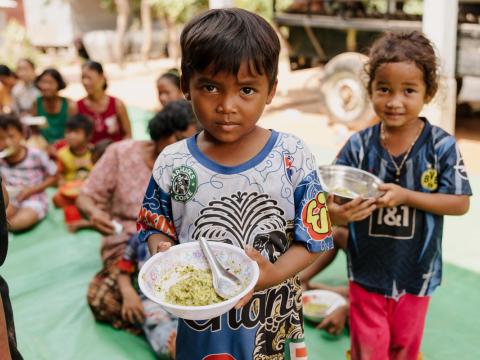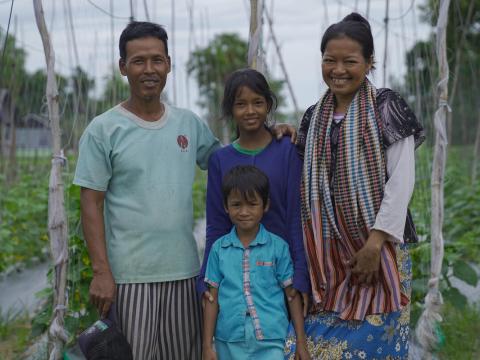
Integral mission: two wings of the same bird
Eu-Lee Chng reflects how evangelism and social action are not opposing, but complementary parts of a Gospel whole
In late September, 2024, an estimated 10,000 Christians from around the world representing churches and Christian Faith-Based Organisations will meet in Seoul, Korea, at the fourth-ever Lausanne Congress, convened by the global Lausanne Movement. Its purpose is networking and reflecting on theology and praxis of Christian mission, in light of emerging trends and global developments.
The first Congress held in Lausanne, Switzerland, in 1974 brought 2,400 Protestant evangelicals from 150 countries in what Time Magazine coined as “...possibly the widest-ranging meeting of Christians ever held”. Prior to this historic event, there had been disagreement among some Christian traditions, particularly evangelicals, over a perceived dichotomisation of evangelism and social action.
By 1974, however, there was a need within the evangelical community to re-examine and seek to clarify the relationship between evangelism and social action within Christian mission. The Lausanne gathering saw heated debates on the role of social action and the congress, nevertheless it concluded with a Covenant that emphasised the holistic nature of mission, balancing the proclamation of the gospel, with the demonstration of the gospel through social action. This holistic nature of mission was further clarified in subsequent Lausanne congresses in Manila (1989) and Cape Town (2010).
The development of this holistic understanding of mission was influenced by Latin American evangelical theologians who had coined the term misión integral. [2] This term to emphasise the holistic nature of mission was translated as ‘integral mission’, a term which continues to be used today to remind the Church that evangelism and social action are like two wings of the same bird, not the same but are equally important. [1]
Caring for people’s needs are found throughout the Bible with examples including the Prophet Micah presenting God’s requirement to His people to practice justice and loving mercy while being committed to God (Micah 6:8). Jesus himself, declared that His mission included preaching the good news and pardoning prisoners, restoring the sight of the blind, and setting the burdened free (Luke 4:18-19). Both examples demonstrate the holistic nature of God’s mission.
Historically, World Vision has played a pivotal role in championing integral or holistic mission by, in the words of Bob Pierce, “challenging Americans to see the world ‘through the eyes of need… physically. . . socially . . . spiritually.”[3]
What is World Vision’s role in this year’s Lausanne’s Congress? God's Church is our indispensable partner to bring about life in all its fullness to everyone. The Church is also recognised as a powerful agent of holistic transformation (one that involves the physical, mental, and spiritual) in communities we work with. This is very much aligned with the increasing recognition that faith communities are crucial allies in “creating effective, sustainable development solutions and deliver effective humanitarian assistance to address the world’s greatest challenges”. [4]
However, we have encountered multiple instances where churches continue to focus on a narrow understanding of the Gospel, in particular on proclamation, without the balance of demonstration through social action. In other words, the local church may have not embraced an integral (or holistic) understanding of mission as its theology of mission.
This is one way World Vision can be a supporting partner to local churches. We can remind them to embrace an integral mission so that issues involving justice, peace, reconciliation and environmental stewardship continue to be included as the local church’s mission with the goal of life in all its fullness for all.
In many areas where we work, we see children being treated poorly, as lesser human beings. Here we can also journey alongside churches in casting a renewed vision where children are protected, are flourishing and are participating in development as active agents of change. In this, we follow Jesus who taught His disciples to let the children come to Him, and not to hinder them for the Kingdom of Heaven belongs to them (Matt 19:14).
Eu-Lee Chng is Senior Programme Manager, Faith and Development at World Vision US
Notes
1. Stott, John, and Christopher J.H. Wright. Christian Mission in the Modern World: Updated and Expanded. Downers Grove, Illinois: InterVarsity Press, 2015.
2. Lausanne Movement. Integral Mission. n.d. https://lausanne.org/network/integral-mission (accessed 9 13, 2024).
3. King, David P. God's Internationalists: World Vision and the Age of Evangelical Humanitarianism. Philadelphia, PA: University of Pennsylvania Press, 2019.
4. USAID. Building Bridges in Development. USAID, 2023.


